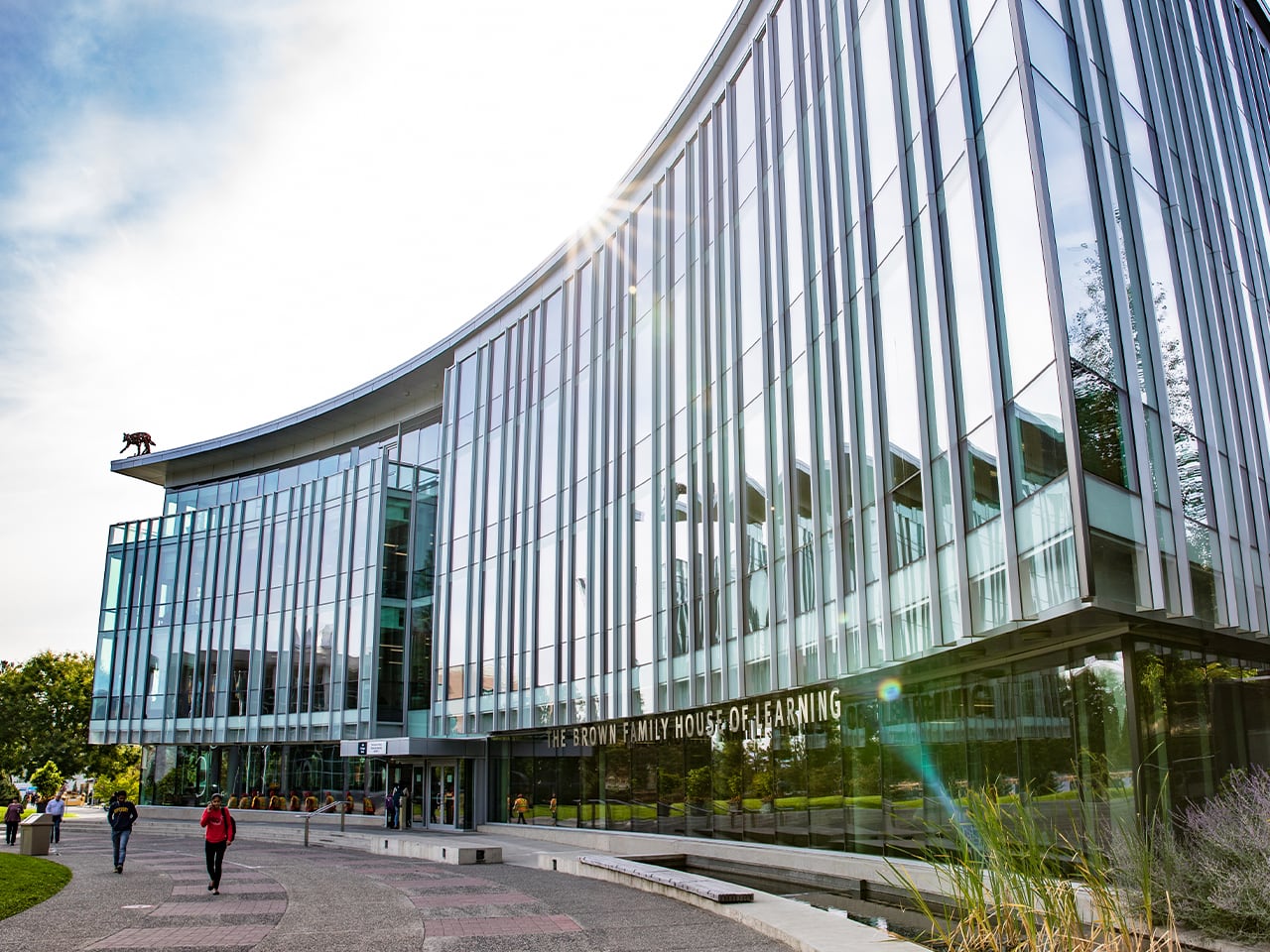Master breaking down complicated problems into tractable steps to solve the difficult questions of our world.
Do you enjoy working on problems and puzzles? Are the details and flow of an argument something you appreciate? Do you delight in thinking logically? Are you often trying to formulate questions in mathematical terms?
Explore the practical applications of mathematics in many areas such as physical and life sciences, finance and economics, computing and information theory, social sciences, and even fine arts.
Gain an understanding of math as the science of patterns, which have evolved from roots in simple arithmetic to a complex language.
Why pursue a Bachelor of Arts, Mathematics Major?
Employers overwhelmingly identify a deficit in measurement and management of risk and uncertainty skills and are in need of employees with mathematical, analytical abilities, able to effectively work with others.
Future proof
You will cultivate the skills that employers are looking for in decision-making, critical thinking, problem-solving, self-learning, working with groups, leadership, global competency, ethics, communication and the ability to apply knowledge in real-world settings.
Experiential learning
Because employers want entry-level candidates with some work experience, you have opportunities in undergraduate research, co-op work placements, practicums, field schools, service learning and study abroad.
Expansive choice
You can explore calculus, computer programming, algebra, discrete mathematics, analysis and economics all within one program.
Collaborative faculty
Your lecturers approach teaching with compassion for their students and truly foster a productive learning environment. Enjoy class with enthusiastic professors, and active listening in small class settings.

What will I learn?
Build a strong mathematical foundation by learning ideas, methods and applications of single-variable differential calculus. Apply derivatives to a variety of problems, such as finding maximum and minimum values of functions. Study differential calculus for functions of one variable, with applications emphasizing the physical sciences. Examine calculation and interpretation of limits and derivatives; curve sketching; optimization and related-rate problems; l'Hospital's rule; linear approximation and Newton's method, Riemann sums, definite and indefinite integrals, techniques of integration, improper integrals, applications of integration, separable differential equations, and series.
Explore systems of linear equations, matrix arithmetic, determinants, real vector spaces, linear transformations, eigenvalues, eigenvectors and diagonalization. Develop an ability to understand proofs and to write your own proofs. Survey logic, set theory, numbers and functions, suprema and infima of sets, completeness, basic metric topology of the real numbers, continuity and limits.
Get introduced to the classical complex function theory, a cornerstone of mathematics. Explore complex derivatives and the Cauchy-Riemann equations; the complex exponential function and related elementary functions; integration along curves and Cauchy's theorems; Taylor and Laurent series; zeros and singularities; residues; and evaluation of integrals using the residue theorem.
Read and analyze scholarly journal articles from a variety of disciplines and develop your ability to compose in the genres and subgenres of scholarly writing, including incorporating research and documentation in a grammatically correct style. Develop skills in close critical reading and writing using a variety of creative narrative texts. Learn to engage in a careful analysis and interpretation of the perspectives, techniques, and rhetorical strategies employed by writers to convey a given subject matter. Practice and build on scholarly writing and documentation skills as the keys to success in any academic discipline and future workplace.
-
100% of graduates said that said the quality of instruction was very good or good
-
91% of employed graduate respondents were working in a job related to their program
-
100% said the knowledge and skills gained were useful in performing their job
-
100% said they developed the skills to be able to speak effectively, analyse and think critically during their studies
Program requirements
First year (30 credits)
- MATH 1130 Calculus 1 for Engineering (3)
- MATH 1230 Calculus 2 for Engineering (3)
or MATH 1140 Calculus 1 (3) - MATH 1240 Calculus 2 (3)
- MATH 1700 Discrete Mathematics 1 (Inactive) (3)
- ENGL 1100 Composition (3)
- ENGL 1110 Critical Reading and Writing (Inactive) (3)
or ENGL 1210 Introduction To Drama & Poetry (3) - COMP 1130 Computer Programming 1 (Inactive) (3)
Second year (30 credits)
- MATH 2700 Discrete Mathematics 2 (Inactive) (3)
- MATH 2110 Calculus 3 (3)
- MATH 2120 Linear Algebra 1 (Inactive) (3)
- MATH 2200 Introduction to Analysis (Inactive) (3)
- ENGL and STAT 2000 level (0)
- Electives Math 22000 can be delayed to the third year (0)
Third and fourth year
- MATH (3000 or 4000 level) 4
- MATH, STAT or COMP (3000 or 4000 level) 5
Electives
Students must also meet the general requirements of the BA degree.
Free form curriculum information
Recommendations:
- Students interested in teaching are advised to take Math 3080 and 3120.
- Students interested in Economics should consult an advisor in the Economics Department for appropriate combination of Math and
- Economics courses. Students may also wish to consider the BA Joint Major in Mathematics and Economics.
- Students interested in pursuing Computing Science 3000 or 4000 level courses must complete COMP 1130, 1230, 2130, and 2230.
- At least one of Math 3070 or Math 3220, and at least one of Math 3000 or Math 3200, must be included.
- No more than 6 of these 9 credits may be in Computing Science.
- Honours program in Mathematics requires all of: Math 3000, 3070, 3200, and 3220 plus Math 4950.
Admission requirements
- Grade 12 (or equivalent) or mature student status
- English Studies 12/English First Peoples 12 with a minimum of 73% (or equivalent)
Admission to each major program may have specific requirements.
- Pre-calculus 12 C+ or equivalent, within the last two years
Career Options / Laddering options
Where will this degree take me?
Studying mathematics opens doors to working in almost any career field. If you’re computationally minded, nearly every industry has roles for analysts. If you’re focused on programming and algorithms, tech-related careers for mathematicians are on the rise. We have included several of the most popular career areas graduates with mathematics majors tend to gravitate towards:
Statistics careers in data science, research and biostatistics.
Computer information systems roles working on software development, cybersecurity and video game programming.
Actuarial science leading to jobs in insurance, statistics and higher education.
Computer science roles in software engineering, web development and database administration.
Economics careers as an analyst, consultant, planner or researcher.
Mathematics education can lead to teaching anywhere from K-12, or higher education after obtaining a master’s level degree.
Many of the best-paying math-related jobs are not what you’d immediately associate with the subject. Some of the careers you can expect to obtain with a Mathematics Studies Major, Bachelor of Arts are:
- Cryptographer
- Actuary
- Mathematician
- Economist
- Statistician
- Financial planner
- Operations research analyst
- Investment analyst
- Systems engineer
- Inventory control specialist
- Accountant
- Insurance underwriter
- Programmer analyst
- Cost estimator
- Quantitative financial analyst
- Purchasing agent
- Market researcher
- Budget analyst
- High school math teacher
- Fraud investigator
- Energy analyst
- Data analyst
- Software tester
- Algorithms engineer
- Mathematical modeler
- Geodesist
- Data scientist
- Meteorologist
Laddering options

What I liked most about my degree at TRU was the opportunity to take self directed courses, I did two of them with two colleagues. Basically we lectured each other throughout the course while our professor supervised in his office. It was a great, intimate way to learn math and I actually got a lot more insight than a typical lecture.”
— Alex Hanna, Bachelor of Science, Mathematics, class of 2018

I'd probably say that I benefited the most from all the opportunities to get involved around campus. I think being able to participate in things such as the economics club, co-op program and career ambassador program allowed me to apply my studies in economics to things outside of the classroom while expanding my personal and professional network.”
— Kailee Mortimer, Bachelor of Economics, class of 2019

Instructors foster fearlessness in a dynamic setting and that’s the part of what made TRU the foundation for success in my career.”
— Evan Choy, finance major, economics and new venture entrepreneurship minor, class of 2018

Kamloops was a great place to go to school. It’s a friendly city and the university is no exception. Because of the small class sizes, you really get to know the faculty and other students, not just in a classroom setting.”
— Sarah Cooke, Bachelor of Arts, class of 2016
Jabed Tomal, assistant professor
Dr. Jabed Tomal is keenly interested in studying the influence of big data and how it influences research in science. “My research focuses on improving the prediction performance of machine learning models by exploiting the richness of useful variables in high-dimensional data to answer interesting research questions.”
— Read more
Mateen Shaikh, assistant professor
When it comes to sorting through the massive volumes of big data, it’s possible to have too much of a good thing. That’s where Dr. Mateen Shaikh comes in. An expert in computational statistics and machine learning, he is developing new models that can help sort through data, leaving researchers with the information they need, while removing the information that is unhelpful.
— Read more
Program Details
- Credential
- Bachelor of Arts, Major in Mathematics
- Delivery
- Kamloops
- Length
- Four years
- Intake dates
- September, January, May
- Applications
- Now accepting applications
- International
- Open to international applicants



